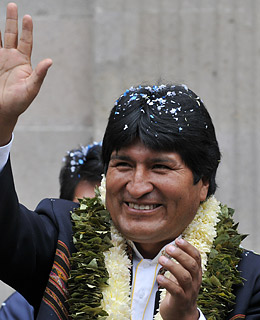
When union organizer Evo Morales was elected President of Bolivia in 2005, it was the first time in the country's history that the indigenous people, who make up roughly 60% of the population, had one of their own as President. He moved quickly away from the neoliberal policies of his predecessors to try to help his community, the vast majority of whom live below the poverty line.
In a time of skyrocketing commodity prices, Morales, 48, earned the ire of the oil companies and the envy of other Presidents in the region by renegotiating outdated energy contracts to earn more money for the country's coffers — a portion of which he put toward increased health-care and social spending. He has resisted the temptations of his high position in favor of a low-key manner that includes an appreciation of simple food — a meat-and-potatoes man, he once took me for lunch at a local BBQ joint — and a taste for wearing his favorite old sweaters.
His government has been unable to accomplish much of what it set out to do. The bureaucrats have dug in their heels, and the country's élites hate his populist rhetoric and close ties to Venezuelan strongman Hugo Chávez. But Morales remains popular with his people. Although he will continue to find that delivering on his campaign promises is hard, his presence in the presidential palace will inspire indigenous people throughout Latin America.
Stiglitz is a Nobel laureate. His latest book is The Three Trillion Dollar War